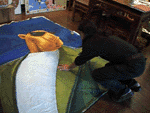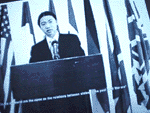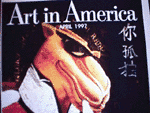
|
Zhou Tiehai displaying a work in progress |
|
"Airport" [02:26 min RealAudio] |
"Airport" is an excerpt from 8-hour sound work presented at the 1996 exhibition, "In the Name of Art" at Shanghai's Liu Hai Su Museum. Curators fly into China, spend several days visiting artists' studios, and then fly off with their discoveries. From a Shanghai artist's perspective, the airport looms large, but not as a place of coming and going. For them "airport" signifies "waiting." They are trapped, longing for the magic call from abroad that will fly them away from their confining circumstances. |
| "And yet," Zhou hints, "Joe Camel is lonely. Worldly possessions cannot fill his emptiness." | Zhou's work documents the buffeting that idealism has endured in an increasingly materialistic age. Born at the onset of the Cultural Revolution in 1966, Zhou believed the party line that exhorted Chinese youth to save the world, to come to the aid of starving people everywhere. The Cultural Revolution promoted a great idealism. The opening to the West in 1978 destroyed Zhou's ardor for service to humanity. Not only were the capitalist countries well-fed, they were rich. |
| In the subsequent battle for the soul of the Chinese people, everyone agrees that money has overwhelmed idealism. Nevertheless, Zhou reminds viewers that material acquisition can never be as joyful as people coming together for a cause. | "Money is all that anybody cares about," scornfully declared, has become a mantra of modern China. |
|
"The Seance"
06:34 min
by the band |
"The Seance" is the current favorite of a young curator at the Shanghai Art Museum, Li Xu. "The song," he explains, "links Chinese history and modern life. On the surface it talks about Buddhism; everything on the surface seems loose." |
| Li Xu, a rock music maven, has prepared a compendium of great rock hits which he will publish as a history of rock and roll. Li's taste in music does not extend to art. He finds contemporary artists too confrontational, too challenging of authority. When London pointed out that the musicians he now likes were once rebels too, Li replied that the songs he preferred balanced the old and the new, and acceptance and criticism of society. | (This cut may be the first time a Chinese group has been pirated in America.) |

